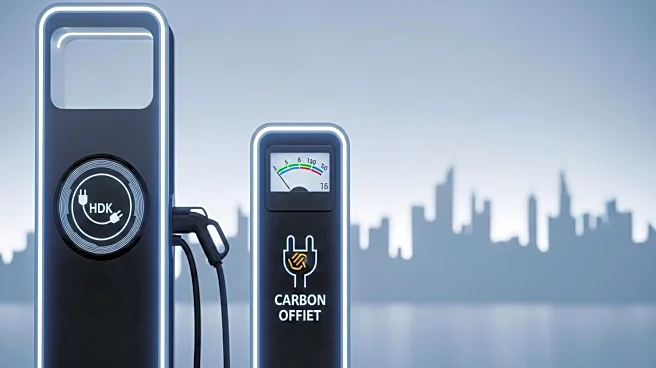What's Happening?
The expiration of electric vehicle (EV) tax credits at the end of September has sparked discussions about the future of carbon offsets and credits in the U.S. While credits for heat pumps and other investments remain available until the end of the year, the sustainability and integrity of carbon offsets are under scrutiny. Research from The Australia Institute suggests that a significant portion of carbon offsets may lack integrity, labeling them as 'hot air.' Concerns have been raised that these offsets could be used to justify the continuation or expansion of fossil fuel projects, potentially delaying direct efforts to reduce emissions. This practice, known as 'greenwashing,' has been criticized by various stakeholders, including Pope Francis, who warned against using carbon credits as a means to maintain excessive consumption.
Why It's Important?
The expiration of EV tax credits and the ongoing debate over carbon offsets have significant implications for U.S. environmental policy and the transition to renewable energy. The integrity of carbon offsets is crucial for ensuring that emission reduction efforts are genuine and effective. If offsets are used to mask continued fossil fuel consumption, it could undermine efforts to combat climate change. This issue affects various stakeholders, including businesses that rely on offsets for sustainability claims, policymakers tasked with regulating emissions, and environmental groups advocating for genuine emission reductions. The scrutiny of carbon offsets may lead to increased pressure for more transparent and accountable environmental practices.
What's Next?
As the debate over carbon offsets continues, stakeholders may push for stricter regulations and transparency in the carbon credit market. This could involve reassessing the validity of existing projects and implementing more rigorous standards for future offsets. Businesses may need to adapt by focusing on direct emission reductions rather than relying on offsets. Policymakers could face pressure to enact legislation that ensures the integrity of carbon credits and prevents greenwashing. The expiration of EV tax credits may also prompt discussions on alternative incentives to promote the adoption of clean energy technologies.
Beyond the Headlines
The broader implications of this development include potential shifts in consumer behavior and corporate sustainability strategies. As awareness of greenwashing grows, consumers may demand more accountability from companies regarding their environmental impact. This could lead to a cultural shift towards more sustainable practices and increased investment in technologies that offer genuine emission reductions. Additionally, the legal and ethical dimensions of carbon offsets may become more prominent, influencing future environmental policies and corporate governance.










